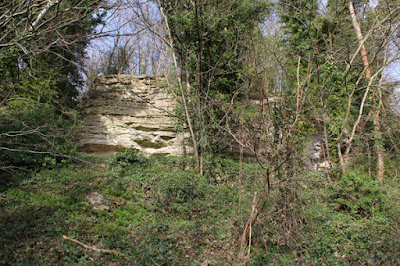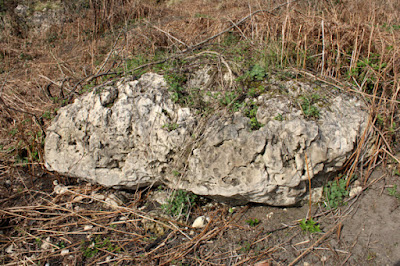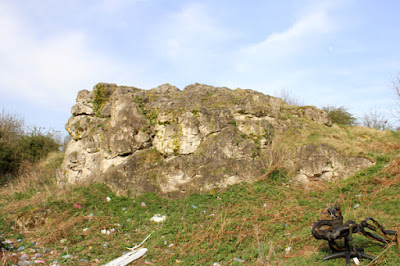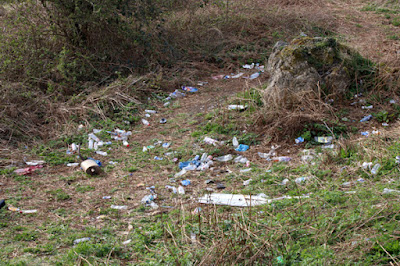 |
| A sample of Permian dolomitic limestone from Maltby Crags |
Continuing my walk from Letwell to Maltby, I left Roche Abbey and headed west along the path that runs at the foot of the dolomitic limestone crags, where there are further examples of thick massive beds and solution cavities.
With the crags disappearing from view behind the trees and undergrowth, I carried on until I reached the railway bridge, built of Staffordshire Blue bricks, which once served Maltby Main Colliery and was dismayed to see a group of teenagers, both boys and girls, with an empty shopping trolley that would no doubt end up being dumped somewhere.
Having seen many discarded ASDA shopping trolleys during various visits to Bowden Housteads Wood, I shook my head in disbelief at their mindless behaviour but, being in no position to say anything, I just carried on in silence.
Stopping only to note an old quarry face, which now forms the backdrop of an obscured private garden and a small outcrop of thinly bedded limestone on the track, after asking a couple of passers-by for the best route, I made my way up the hill to Maltby Crags.
When I last visited Maltby Crags a few years earlier, in early October, the area was largely covered in shoulder high bracken, which made access quite difficult and obscured very many of the smaller rock outcrops here.
At one of the small outcrops that I could now see, I obtained a couple of small samples from a part where the unbedded mass of limestone has a very open sponge like texture, which were surprisingly difficult to remove with my Estwing brick hammer.
I then went to find the principal Permian bryozoan reefs which, according to the JNCC (Joint Nature Conservation Committee) Geological Conservation Review entry for Wood Lee Common, are “the most accessible and amongst the best localities for the structure and fabric of typical bryozoan patch reefs in the Wetherby Member of the Cadeby Formation”.
Designated as a geological SSSI (Site of Special Scientific Interest), large saccoliths have weathered out from the surrounding dolomitic limestone to leave tor like features - as described by the late Denys Smith, the British Geological Survey (BGS) field geologist who essentially defined the Marine Permian of England.
When approaching the lower reefs, to which I could now easily gain access, I was disgusted to see that one of the reefs had been daubed with extremely childish graffiti but, when further discovering that the area had turned into a rubbish tip, I then became incensed.
During my various walks since the beginning of the COVID-19 Pandemic, I had seen numerous examples of wanton disposal of miscellaneous rubbish along various paths and roadsides – from McDonald's or KFC containers thrown out of a car window to fully fledged fly tipping.
On this occasion, a burnt office chair, a catalytic converter and an ironing board were just the highlights amidst a great scattering of plastic bottles, cans and miscellaneous rubbish, which I am sure that the miscreant teenagers – probably high on whatever drug they could lay their hands on – wouldn’t even notice.
My efforts and achievements with the South Yorkshire RIGS (Regionally Important Geological Sites) Group, further work with the BGS and local museums have been quietly forgotten by SAGT (Sheffield Area Geology Trust) – an organisation that have appointed themselves to be the guardians of the geology of South Yorkshire – and Rotherham MBC, but I still retain a great interest in geological conservation in the region.
As I knew only too well, a group that comprises mainly long since retired university academics and school teachers – none of whom live in Rotherham – was in no position to report this and at the first opportunity I therefore e-mailed several individuals and organisations who I thought should be made aware of this.
Most of the recipients of my e-mails didn’t bother to reply, but a single phone call to the head of planning at Rotherham MBC obviously made its mark, with e-mails immediately circulated to the officers concerned. The head of waste disposal actually phoned me to assure me that, once the Easter Bank Holiday had passed, a team would be sent immediately to clear up this mess - and to remove the graffiti - but I have not been back to Maltby Crags since to see if this has been done.














Why are the Crags important in a geological sense? is it because it is the edge of a limestone reef?
ReplyDeleteYes, it is an excellent example of a bryozoan patch reef, as mentionedin the description of Wood Lee Common in the Geological Conservation Review... https://data.jncc.gov.uk/data/65e27eb2-ba95-4890-9450-8e9004c8e7f5/gcr-v8-marine-permian-of-england-c4.pdf
DeleteI do have some old pictures of the Crags taken around the 1930's
Delete